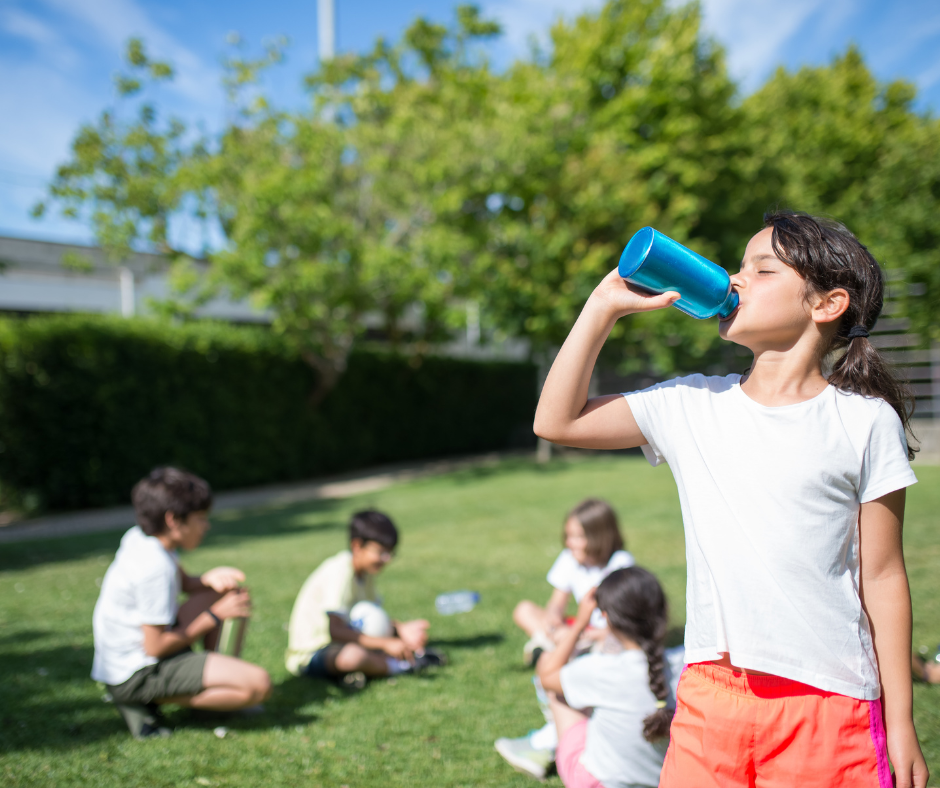Healthy Drinking Habits for Kids: A Guide to Better Beverage Choices

Establishing healthy drinking habits in childhood lays the foundation for a lifetime of better nutrition and overall wellness. Despite ongoing efforts to improve beverage intake among young children, many still aren’t getting the fluids they need to support proper growth and development, and consumption of liquids with high sugar content is rising. Consuming things like sodas, juices, pre-packaged smoothies, or slushies can significantly increase your child’s sugar intake and put them at higher risk for diabetes, obesity, and tooth decay.
Healthy beverage choices are a cornerstone of good nutrition for children. By following the expert recommendations with clear, evidence-based guidelines in hand, families can work together to create a healthier future, one sip at a time.
General Guidelines
Prioritize Water and Plain Milk: Water is essential for life and should be the primary beverage, while plain pasteurized milk provides vital nutrients such as calcium and vitamin D. We know many kids love chocolate or strawberry flavored milk, but try to only use these as treats and stick to plain milk for mealtimes.
Avoid Added Sugars: Steer clear of sugar-sweetened beverages, flavored milks (like chocolate or strawberry), and drinks with low-calorie sweeteners, as these can contribute to excessive sugar intake.
Be Wary of Caffeine and Plant-Based Milks: For young children, caffeinated beverages should be avoided, and most plant-based, non-dairy milks (like almond, rice, or oat) are not recommended as direct substitutes for dairy milk because they often lack equivalent nutritional benefits—except in cases where a fortified soy milk is appropriate.
Tailor Intake to Age and Activity: Fluid needs can vary based on factors such as physical activity, climate, and overall diet, so consider these guidelines as a starting point that may require adjustment for your child’s unique needs.
Key Tips for Different Age Groups
Infants (0 to 6 Months)
Beverage Choice: Exclusively breast milk or infant formula.
Why It Matters: Both provide all the necessary hydration and nutrition during this early developmental phase.
Babies (6 to 12 Months)
Introducing Water: Start offering plain, fluoridated water—about a half-cup to 1 cup per day, ideally in a cup during mealtimes.
Milk Transition: Continue with breast milk or formula while gradually introducing water as complementary hydration.
Toddlers (1 to 3 Years)
Milk Guidelines: For toddlers aged 1 to 2 years, aim for 2 to 3 cups of whole milk per day. As toddlers begin eating more solid foods, their need for milk may decrease.
Water Intake: Offer about 1 to 4 cups of water daily. Introduce water during meals and snack times.
Juice Caution: If offering 100% juice, limit it to small amounts (about 4 ounces per day) to avoid excess sugar intake.
Preschoolers (4 to 5 Years)
Water Consumption: Increase water intake to around 1.5 to 5 cups per day, keeping hydration consistent throughout the day.
Milk Guidelines: Transition to plain, pasteurized fat-free or low-fat milk. Aim for up to 2.5 cups per day.
Overall Beverage Choices: Continue to avoid flavored milk, sugar-sweetened beverages, and other drinks that contain added sugars or stimulants.
School-Age Children and Adolescents (5 to 18 Years)
Water Recommendations:
Ages 5 to 8 years: 16 to 40 ounces daily.
Ages 9 to 13 years: 22 to 61 ounces daily.
Ages 14 to 18 years: 29 to 88 ounces daily.
Milk Guidelines:
Ages 5 to 8 years: Up to 20 ounces of plain pasteurized milk daily.
Ages 9 to 18 years: Up to 24 ounces daily.
Juice Limits:
Ages 5 to 8 years: 4 to 6 ounces of 100% juice.
Ages 9 to 13 years: 6 to 8 ounces.
Ages 14 to 18 years: Less than 8 ounces.
Overall Beverage Choices: Continue to emphasize plain water and milk. Flavored beverages, sugar-sweetened drinks, and those with added low-calorie sweeteners or caffeine should be avoided to support long-term health.
Encouraging Healthy Beverage Habits
Implementing these guidelines doesn’t have to be challenging. Here are a few tips for parents and caregivers to help nurture these habits:
Lead by Example: Children are likely to mirror the drinking habits of their caregivers. Choose water and plain milk yourself.
Make It Fun: Serve water in colorful cups or with fun straws. Maybe let your child pick out a new water bottle to use for the school year or Summer.
Educate Gently: Explain the benefits of healthy drinks in simple terms. Kids are more likely to follow good habits when they understand the “why” behind them.
Be Consistent: Regularly offer healthy beverages and keep sugary or artificially flavored drinks out of easy reach.
Monitor Portions: Use age-appropriate serving sizes to ensure children are neither under- nor over-hydrated.
Make it a treat: Limit sugary drinks to special occasions as “treats,” for instance allowing a soda or slushy at the movie theater, but not buying soda to keep on-hand at home.
It’s important to remember that building healthy habits takes time and it can be a process to cut out unhealthy habits. We are not saying you can never have a soda again, but make it a part of an overall healthy lifestyle and diet.
For questions, to book an appointment, or any other concerns, Augusta Pediatrics can be reached at (706) 868-0389. The information on this site is not intended or implied to be a substitute for professional medical advice, diagnosis or treatment. All content, including text, graphics, images and information, contained on or available through this web site is for general information purposes only.

Leave a Reply